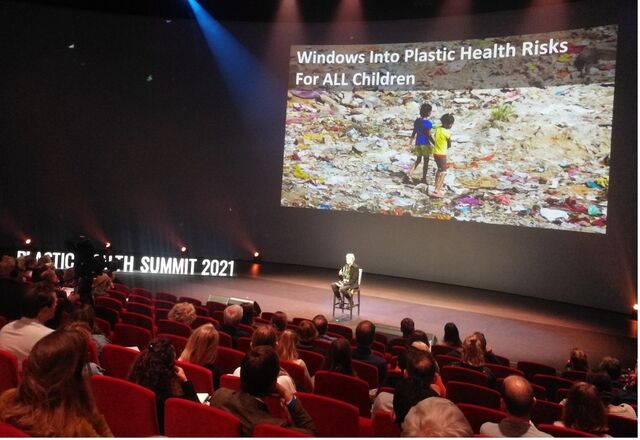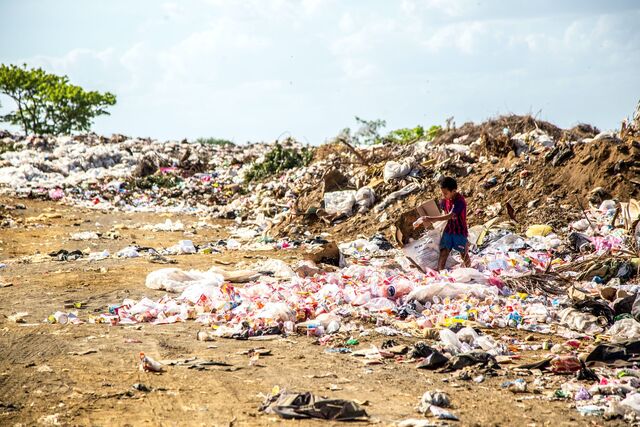Does plastic make us sick?
That was the question hanging in the air at the opening of the 2021 Plastic Health Summit that took place in Amsterdam last week, organised by the Plastic Soup Foundation.
And the answer? Definitely yes, in a myriad of ways, in every country, all over the planet.
I attended the conference to represent Common Seas and support our CEO, Jo, as she took the stage to open proceedings with a keynote speech.
The schedule was jam-packed with some of the greatest minds in plastic health research.
We heard from Prof Dick Vethaak at Deltares, also one of Common Seas' fantastic advisors, who showed us how our body is exposed to 100 million plastic particles every day.
We know that persistent particles that the body can't break down, can induce or enhance an immune response, causing oxidative stress and inflammation, which is linked to a host of chronic illnesses.

Throughout the day, we heard of the growing evidence that the same is true for plastic particles.
Dr. Hanna Dusza shared research conducted in the laboratories at Utrecht University, which demonstrates the potential for plastic particles to pass through the placenta into the unborn foetus. We heard from other researchers about how textile workers, who are exposed to high levels of airborne plastic particles, suffer from increased chances of respiratory diseases and cancer. And about reduced fertility in animals fed a high dose of microplastics.
The same plastic particles that can reach our children in the womb harbour toxic chemicals that can affect the genes responsible for the production of hormones, like progesterone and oestrogen, which play an important role in maintaining pregnancy. Prof. Patricia Hunt from Washington State University described these chemicals as ‘sending static through the complex endocrine system that affects growth, sexual function, sleep and behaviour’. What’s more, she showed how these chemicals have multigenerational impacts on exposed mice, because they cause chromosomal mutations at the earliest stages of life. This means that, even if we stop using them today, future generations could be dealing with the aftermath for many years to come.
Dr. Esperanza Lwanga from Wageningen University explored how microplastics affect food safety. She described how plastic particles disrupt microbial communities in soils, interfere with plant photosynthesis and are absorbed into the food that we eat, like wheat, carrots and apples.
Even though these particles are tiny (as small as bacteria), they are part of the much bigger story – one that chronicles the harm caused by plastic across its entire life-cycle. Two shocking case studies, presented Jane Patton (Centre for International Environmental Law) and Diane Wilson (San Anatonio Bay Waterkeeper), brought this to life. They documented decades of environmental, safety, labour and health violations made by Formosa Plastics Group, the world’s fourth-largest producer of petrochemicals and plastics.
Professor Susan Shaw also spoke powerfully about the children as young as five who sort through piles of plastic waste in open dumpsites, exposed to the noxious fumes from burning waste. Much of this is waste exported by western nations, which – sickeningly – is counted towards our meagre national recycling rate statistics.

The system is clearly failing these children and communities… but does the system of today make these injustices inevitable? During his closing remarks, Captain Charles Moore from the Moore Institute of Plastic Pollution Research certainly seemed to think so. He ruefully speculated that a series of short sickly generations is more profitable to businesses than-long lived healthy ones.
But positive change is happening and there was also lots of good news shared at the summit:
Hugo Schally from the EU Commission talked, with cautious optimism, about a forthcoming global treaty on plastics; encouraged by the 50+ countries, led by Peru and Rwanda, now working to bring forward a resolution.
Jojo Mehta from Stop Ecocide International believes that ecocide law is now inevitable, for the first-time criminalising harm to nature.
And crucially, the science exposing the health risks associated with plastic is progressing. During the event, I felt proud to see how Common Seas is playing a part in this:
- CEO Jo Royle spoke about Common Seas’ call on the UK Government to establish a £15 million ‘National Plastic Health Impact Research Fund’ to accelerate this work. And she reminded the audience that, ‘it’s not how big your scientific consensus is, it’s what you do with it that counts!’. For our research to be world changing, it must be backed by strong science communication to motivate action by governments and businesses.
- Dr. Heather Leslie shared pioneering work to test for the presence of plastic particles in human blood. Read more about our work with Vrije Universiteit on Blood Type Plastic here.
- We also heard from our friends and allies at Ecoton in Indonesia, about their efforts to protect communities along the Brantas River from mismanaged waste. They highlighted the single-use diaper, perhaps the most pernicious plastic polluter in the region, which is the focus of Common Seas’ Clean Blue Indonesia.
- And Bas van der Zaan from Deltares, one of Common Seas’ lead researchers, shared our work to determine the role of single-use diapers in spreading human disease in Indonesia.
It’s clear that there is a lot of work yet to be done, and sometimes the task ahead can feel overwhelming. The Plastic Health Summit provided an important opportunity to share progress, forge new collaborations, and build a renewed sense of optimism for a future where plastic waste does not threaten our bodies, or our Ocean.
My heartfelt thanks to the unstoppable Maria Westerbos, and her amazing team at Plastic Soup Foundation for making it happen.
Ben Jack
Director, Programmes
Common Seas


